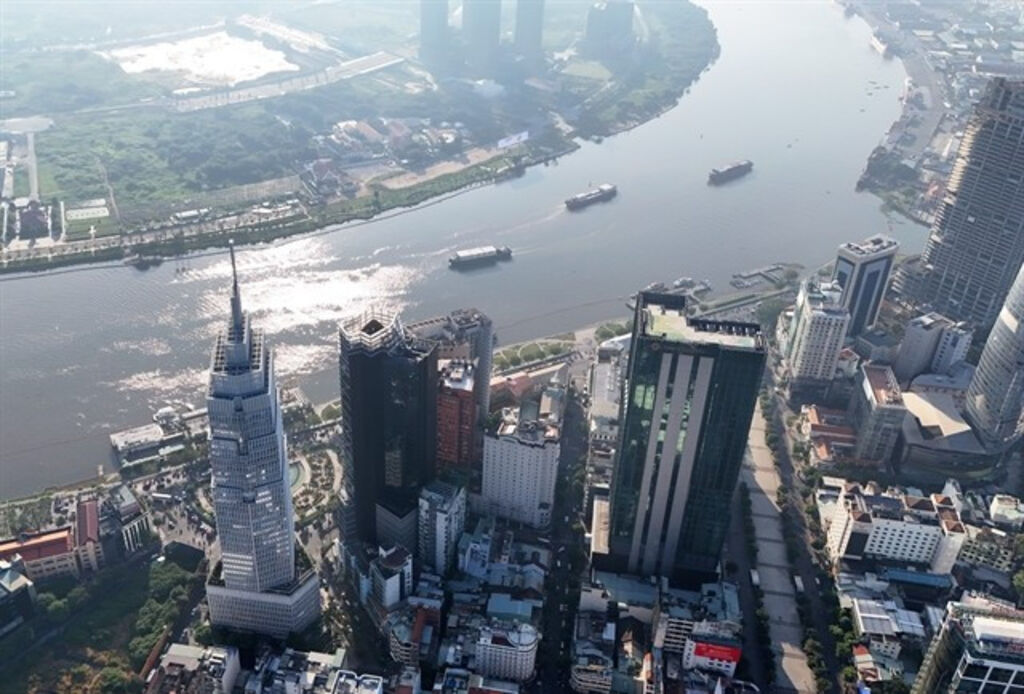 |
| A corner of HCM City, opposite to the area where the IFC will be developed. The State Bank of Vietnam has proposed regulations to manage capital flow at the IFC__Photo: VNA |
The State Bank of Vietnam (SBV) has proposed that all international electronic money transfers valued at USD 1,000 or more within the country’s forthcoming International Financial Center (IFC) must be reported to strengthen monitoring mechanisms and anti-money laundering (AML) efforts.
The SBV is gathering public comments for draft decrees on the licensing and operation of banks, foreign exchange management, AML and anti-terrorist financing at the IFC.
These decrees are expected to be passed within this month following a streamlined process.
The proposal aims to prevent capital from flowing out of the domestic economy into the IFC and then investing abroad, which contradicts the goal of attracting capital into Vietnam.
Accordingly, all international electronic transactions conducted through the IFC valued at USD 1,000 or more must be reported, in line with Circular 09/2023 guiding the implementation of the Law on Anti-Money Laundering.
Domestic transfers exceeding VND 500 million (USD 21,000) are also subject to reporting requirements.
The SBV said that as most transactions in the IFC will utilize international payment systems such as SWIFT, it is necessary to apply the international reporting regime to manage risks from the outset.
Once the IFC becomes operational, the SBV will conduct a comprehensive assessment of transaction volume, risk levels and the capacity for data storage and analysis to support AML efforts. Based on this evaluation, reporting requirements may be adjusted to better reflect the real situation.
The SBV also outlined stringent conditions for licensing commercial banks and regulating capital flows within the IFC, aiming to ensure robust governance, risk control and alignment with national economic objectives.
For wholly domestically owned commercial banks seeking establishment approval in the IFC, the draft requires a minimum total asset base of VND 100 trillion (USD 4.2 billion) as per audited consolidated financial statements from the previous year. Additionally, banks must have internal policies compliant with Vietnam’s laws on AML, counter-terrorism financing and prevention of proliferation financing of weapons of mass destruction.
More rigorous conditions would be applied for foreign-owned commercial banks applying for IFC licenses, including a minimum of AA- from Standard & Poor’s or Fitch Ratings, or Aa3 from Moody’s, together with total assets equivalent to at least 10 billion USD at the end of the year preceding the license application.
IFC member banks may facilitate capital movement from the IFC to the domestic economy, capital circulation within the IFC, and flows between the IFC and global markets. However, capital transfers from the domestic economy into the IFC might be restricted.
Under the draft, IFC members would not be allowed to raise capital from domestic organizations or individuals who are not IFC members.
The draft stipulates that payment and transfer transactions between IFC members must be executed through foreign currency settlement accounts opened at commercial banks or branches that the SBV is a member of, aiming to reinforce transparency and control over cross-border capital flows within the financial hub.
The proposed regulations aim to promote capital inflows from the IFC into the rest of Vietnam while restricting the reverse flow.
Regarding the supervision role of the SBV over banking operations at the IFC, the draft offers two options. In the first, the SBV will be in charge for the first five years then transfer the task to the executive and supervision agencies. In the second, the supervision agency will carry out the task from the outset.
According to Nguyen Huu Huan from the HCM City University of Economics, banks operating at the IFC must have adequate capital and governance capacity.
He said the capital flow restrictions from the domestic economy into the IFC are reasonable to prevent illegal capital transfers abroad, ensure monetary security and keep risks under control, stressing that this is important to ensure stable operations and the development of the IFC.
Huan said the SBV should play an advisory and supportive role in the initial period to avoid bureaucratic delays.
He also highlighted the importance of clear license revocation rules and suggested the IFC serve as a testing ground for innovative policies like bank bankruptcy procedures and the issuance of central bank digital currency (CBDC).
Meanwhile, financial expert Nguyen Tri Hieu said further consideration is needed on the regulations managing capital flows in the draft.
Hieu stated banks outside the IFC should be allowed to finance partners inside the IFC.
“When providing capital to a partner in the IFC, banks must ensure control of the capital flow in accordance with foreign exchange management and AML regulations,” he said.
Regarding license revocation, Hieu said it is necessary to refer to the practices of other countries in closely following the minimum capital adequacy ratio (CAR).
For example, if CAR is 5-8 percent, the bank will be subject to warning and required to improve within a certain period.
If CAR falls to 3-5 percent, the warning level rises and immediate improvement is required. If CAR drops below 4 percent, the bank is forced to close.
Hieu stressed the SBV should maintain direct oversight over the IFC, citing the complexity and macroeconomic significance of IFC banking activities.
Efforts are being geared up to put IFC in HCM City and Da Nang into operation by the end of this year.- (VNA/VLLF)









